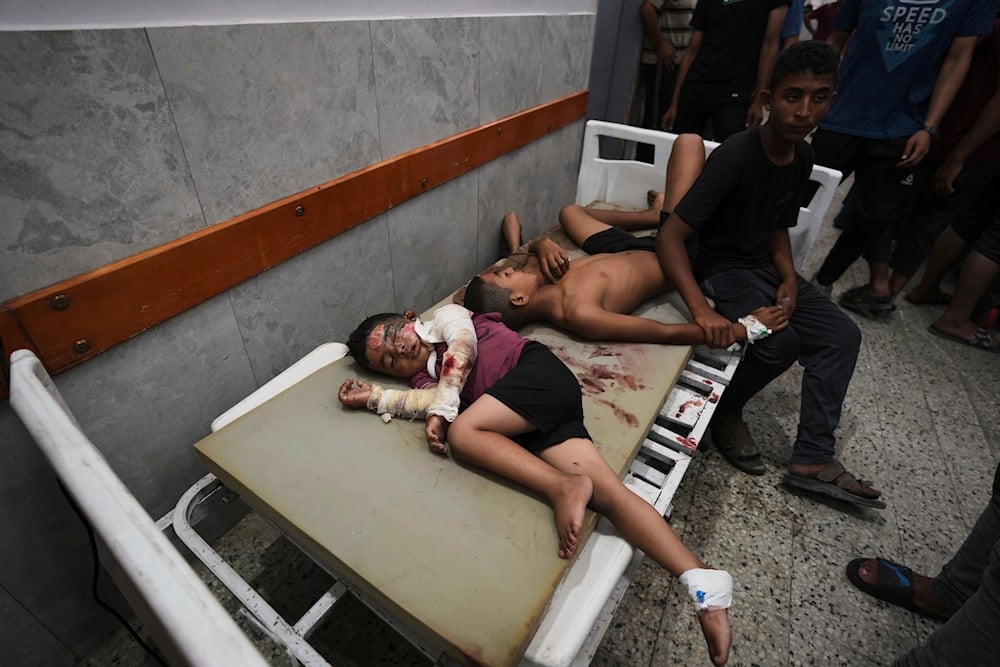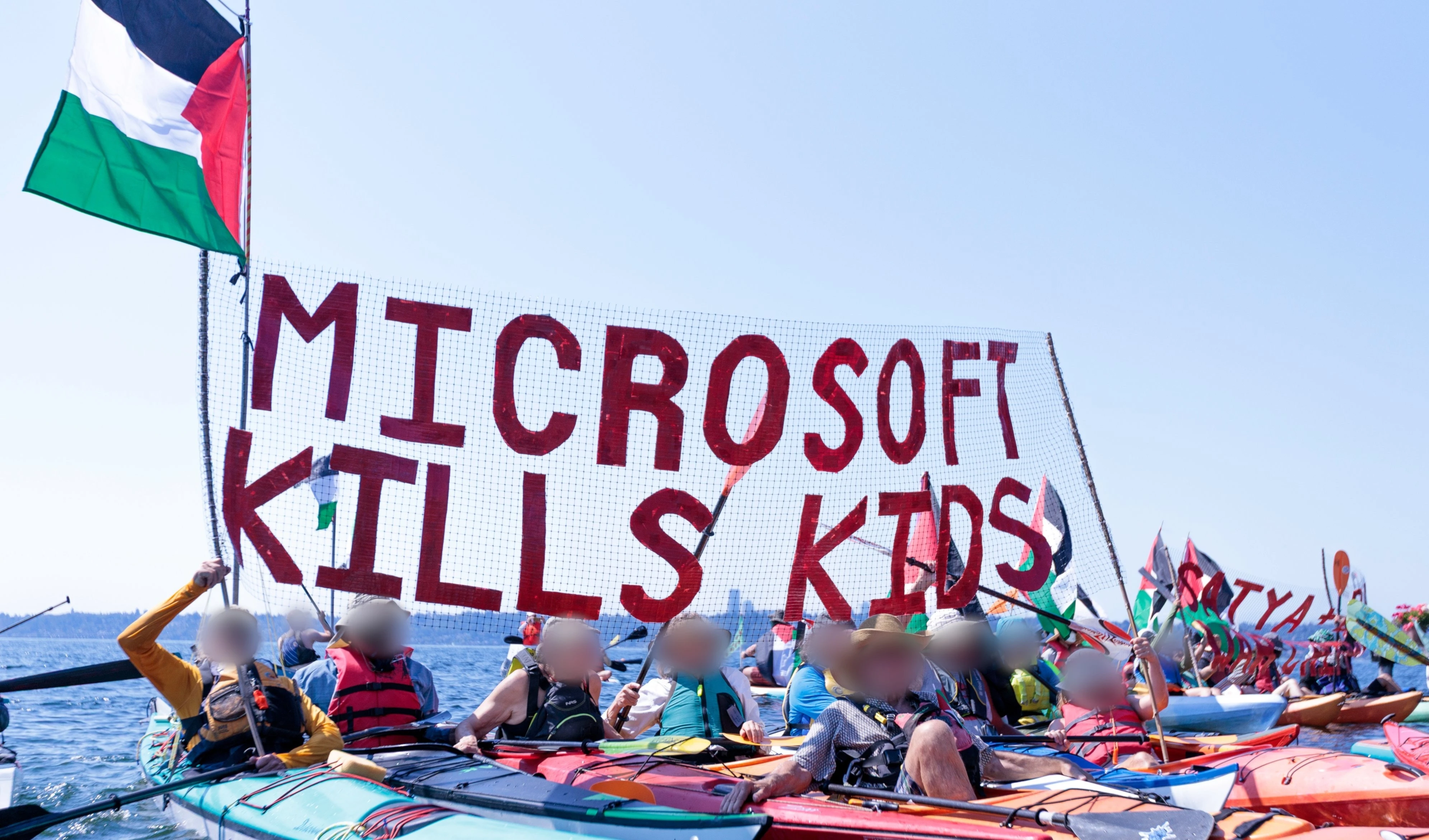Barbados court hears genocide case over Israeli war crimes in Gaza
Human rights advocates in Barbados push the Supreme Court to investigate ties to Israeli war crimes, demanding border controls and constitutional accountability.
-

Wounded Palestinian children are brought to Al-Shifa Hospital in Gaza City after they were injured by an Israeli airstrike that struck a school used as a shelter (AP)
In a potentially precedent-setting move for international justice, the Caribbean Movement for Peace and Integration (CMPI) has filed a groundbreaking case before the Supreme Court of Barbados, calling on the government to confront what it characterizes as “Israel’s” ongoing genocide in Gaza.
The legal motion urges the Barbadian state to realign its foreign policy with its obligations under international humanitarian law, in response to mounting evidence of war crimes, genocide, and crimes against humanity committed against Palestinians.
Filed by CMPI Secretary David McDonald Denny and led by human rights lawyer Lalu Hanuman, who also serves as Secretary of the Caribbean Against Apartheid in Palestine (CAAP), the case names several high-level Barbadian officials and agencies as respondents. These include the Minister of Foreign Affairs and Foreign Trade, the Attorney General, the Director of Public Prosecutions (DPP), and the Immigration Department.
The petition demands that the Barbados Supreme Court issue six critical declarations:
- that “Israel” is committing genocide in Gaza;
- has perpetrated war crimes;
- is guilty of crimes against humanity;
- that it enforces an apartheid regime against Palestinians;
- that the failure of the Director of Public Prosecutions (DPP) to investigate individuals in Barbados connected to these crimes violates both the Genocide Act and Article 11 of the Constitution, which guarantees life, liberty, and security;
- that Barbados must implement strict border screening for Israeli passport holders and take legal action to prosecute or deport, regardless of diplomatic immunity, anyone linked to war crimes, crimes against humanity, or genocide.
Justice Wells: The case must proceed urgently
Presiding Justice Dr. Herbert Patrick Wells acknowledged the international gravity of the motion, ordering that the case proceed without delay, citing the escalating humanitarian crisis in Gaza. Observers included CAAP members and law students from the University of the West Indies, Cave Hill Campus, signaling the case’s profound significance across the Caribbean legal community.
The suit challenges Barbados’s ongoing diplomatic and trade ties with “Israel” as human rights organizations, including Amnesty International, the International Committee of the Red Cross, and UN agencies, continue to report widespread violations of international law in Gaza.
UNICEF spokesperson James Elder recently condemned the daily deaths of Palestinian children due to hunger and dehydration, while UN Special Rapporteur Francesca Albanese described “Israel’s” actions since October 7 as an orchestrated campaign of “population erasure” that urgently demands global intervention.
Legal and moral obligations under global treaties
“Barbados and CARICOM once stood at the vanguard of the anti-apartheid struggle in South Africa,” Denny said. “To remain silent now is not neutrality, it is complicity in genocide.”
The legal team argues that, as a signatory to core treaties, including the UN Charter, the Genocide Convention, and the Geneva Conventions, Barbados has an obligation to prevent and punish such crimes. Under the principle of universal jurisdiction, any suspected perpetrators present on Barbadian soil must be prosecuted or expelled.
“If the DPP fails to act,” said Hanuman, “that failure violates Article 11 of our Constitution and undermines Barbados’s legal and moral standing.”
The motion also calls for strict denial of entry to individuals associated with atrocity crimes and for deportation where prosecution is not feasible, even in cases involving diplomatic personnel.
Pressure builds ahead of CARICOM summit
This legal action comes on the eve of the 49th Regular Meeting of the CARICOM Conference of Heads of Government (July 6–8, 2025), amplifying calls for a unified regional stance. Organizers stress that this is not a symbolic gesture but a demand for binding legal accountability rooted in both constitutional and international law.
“We are bound by the same moral compass that once guided us against apartheid,” said Denny. “Today, that compass points to Gaza. Justice for Palestine is part of our historical legacy and our moral duty.”
The next Supreme Court hearing is scheduled for Monday, July 21. The plaintiffs are urging other CARICOM states to follow suit and establish legal pathways to hold perpetrators accountable under international law.
Echoing the words of Nelson Mandela, Denny concluded, “Our freedom is incomplete without the freedom of the Palestinians.”

 4 Min Read
4 Min Read








